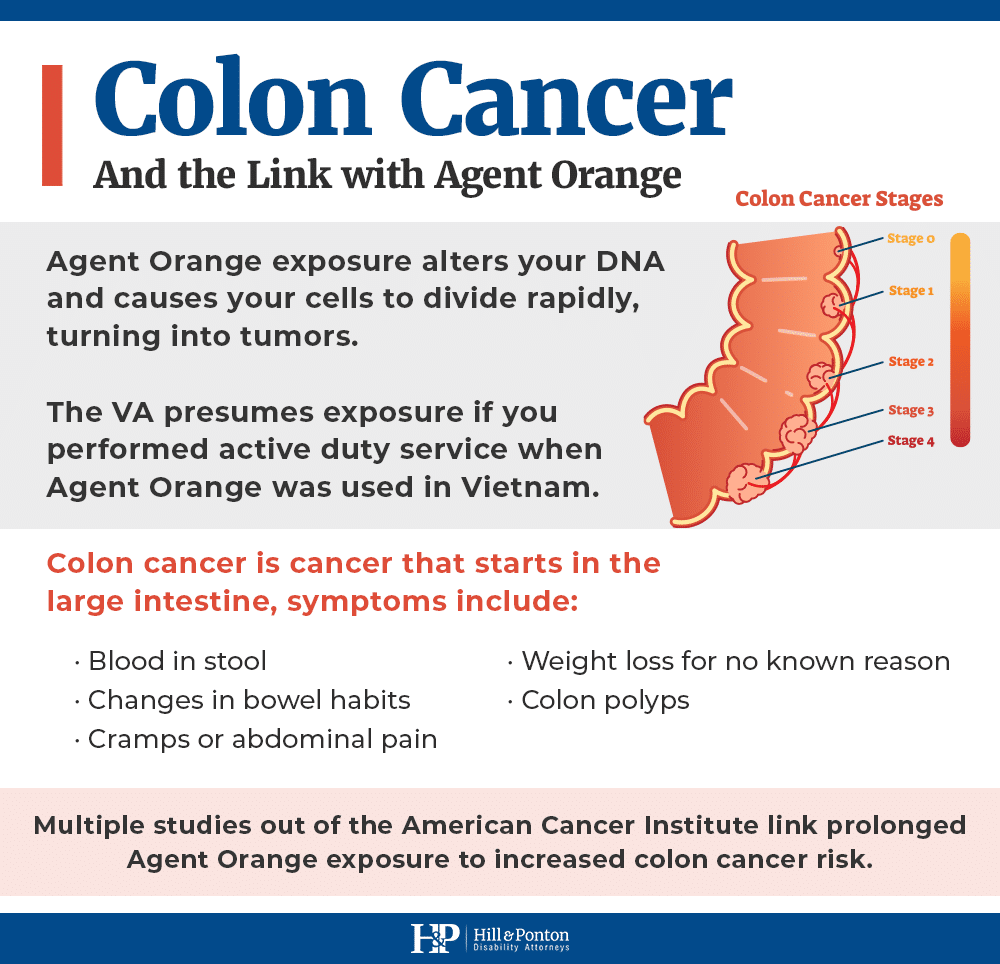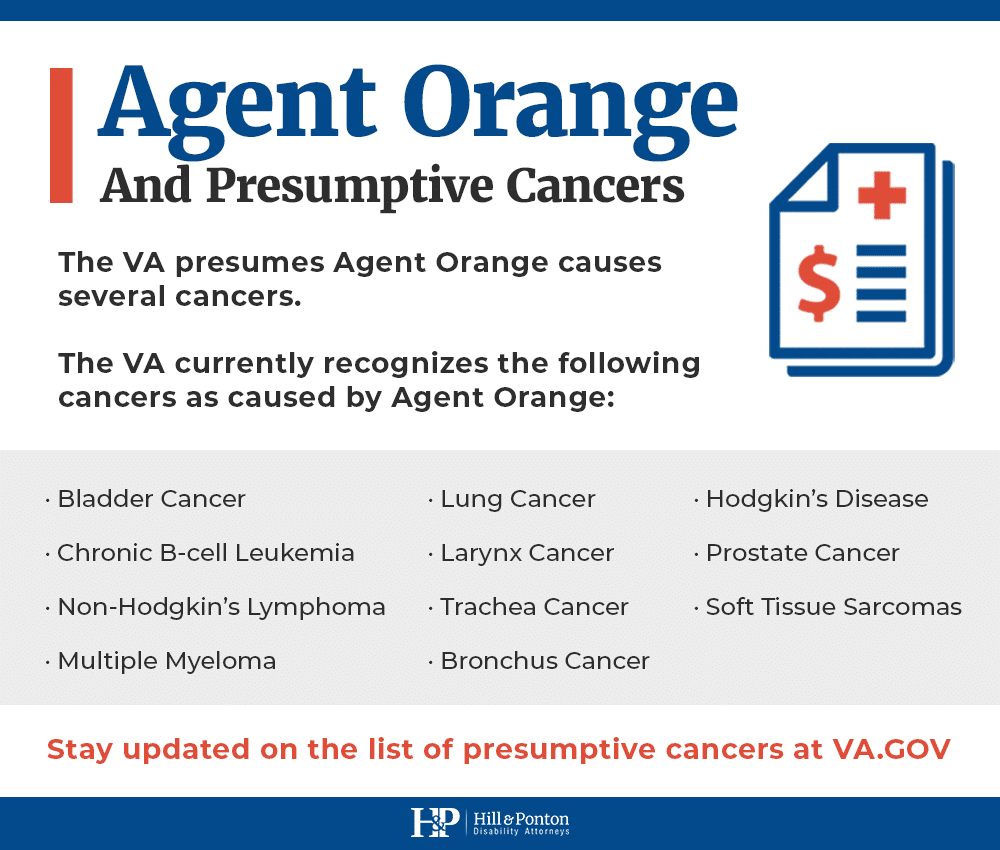If you served in the Vietnam War between January 9, 1962, and May 7, 1975, you may have been exposed to Agent Orange, a dangerous herbicide used by the U.S. military. Exposure to this toxic chemical has been linked to various serious health issues, including cancers like colon cancer.
Although colon cancer is not currently recognized as a presumptive condition by the VA, emerging research supports a connection. Understanding this relationship can help you take the steps needed to monitor your health, file for benefits, and fight for service connection. Here’s everything you need to know about Agent Orange and colon cancer.
What is Agent Orange and How Do You Get Exposed?
Agent Orange is a herbicide used during the Vietnam War to eliminate dense vegetation and enemy cover. Veterans were exposed to the toxic chemical through:
- Inhalation of contaminated air.
- Ingestion of contaminated food or water.
- Skin contact during or after spraying operations.
Exposure to Agent Orange has been proven to cause rapid DNA alterations and uncontrolled cell division, both of which can lead to cancerous tumor growth. While there’s no definitive test for Agent Orange exposure, the VA presumes exposure for veterans who served during the specified period in Vietnam. Learn more about Agent Orange and its health impacts here.

What is Colon Cancer?
Colon cancer develops in the large intestine and is one of the most common cancers diagnosed in the United States. If left untreated, it can spread to other organs like the liver or lungs. Between 2010 and 2022, the incidence of colorectal cancer among active component service members was 4.44 cases per 100,000 person-years, with rates increasing significantly for those over 45 years of age.
Know the Symptoms
Be aware of these common colon cancer symptoms:
- Blood in stool
- Changes in bowel habits (persistent diarrhea or constipation)
- Cramps or abdominal pain
- Unexplained weight loss
- Colon polyps (pre-cancerous growths that can develop into cancer)
If you experience any of these symptoms, especially as a veteran with Agent Orange exposure, it’s critical to seek medical attention immediately.
Agent Orange and Colon Cancer: What’s the Connection?
Studies, including research from the American Cancer Institute, suggest a link between prolonged Agent Orange exposure and an increased risk of colon cancer. The herbicide’s toxic chemical, dioxin, has been shown to:
- Alter DNA.
- Accelerate tumor growth.
- Trigger inflammation that can lead to cancer.
While the VA recognizes several cancers as presumptively caused by Agent Orange exposure, colon cancer is not currently on this list.
Challenges in VA Recognition
The VA does not yet recognize colon cancer as a presumptive Agent Orange condition. This means veterans must provide strong evidence, such as:
- Documentation of service in Vietnam or other exposure areas.
- Medical opinions linking colon cancer to Agent Orange exposure.
How to Fight for VA Compensation
If you believe your colon cancer is service connected to Agent Orange exposure, you have options:
Appealing a Denied Claim
Many veterans have successfully appealed denials for colon cancer claims by:
- Submitting medical evidence or doctor’s opinions supporting the connection.
- Providing lay statements about symptoms and their impact on daily life.
- Seeking support from a VA disability attorney or qualified expert.
For example, in 2015, a veteran won their appeal after submitting medical records and expert opinions linking their colon cancer to Agent Orange exposure.
If your VA claim for colon cancer caused by Agent Orange exposure has been denied or received an inadequate rating, don’t give up. At Hill & Ponton, we specialize in helping veterans fight for the benefits they deserve.
Contact us today for a free case evaluation, and let an experienced Agent Orange lawyer help you navigate the appeals process.
Get Your Free Case Evaluation →
Presumptive Cancers Caused by Agent Orange

The VA currently presumes Agent Orange exposure causes the following cancers:
- Bladder cancer
- Chronic B-cell leukemia
- Hodgkin’s disease
- Non-Hodgkin’s lymphoma
- Prostate cancer
- Respiratory cancers (lungs, larynx, trachea, bronchus)
- Soft tissue sarcoma
- Multiple myeloma
If you have colon cancer alongside one of the above conditions, you may still qualify for compensation.
VA Claims for Colon Cancer
While colon cancer is not yet a presumptive condition, filing a claim is essential. Appeals can succeed with strong evidence, even without presumptive status. The VA has updated the presumptive list before (e.g., adding bladder cancer and hypothyroidism in 2021).
Filing a claim ensures you’re positioned to receive benefits if colon cancer is added in the future.
Stay Informed with Expert VA Claim Tips
Navigating VA claims can be overwhelming, but you don’t have to do it alone. Sign up for The VETS Advantage, our weekly newsletter packed with:
- Expert tips for filing and appealing VA disability claims.
- Step-by-step guides to help you get the benefits you deserve.
- Updates on VA policy changes and essential resources for veterans.




